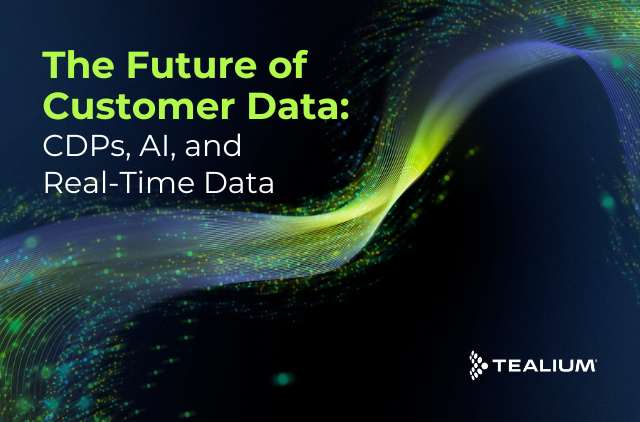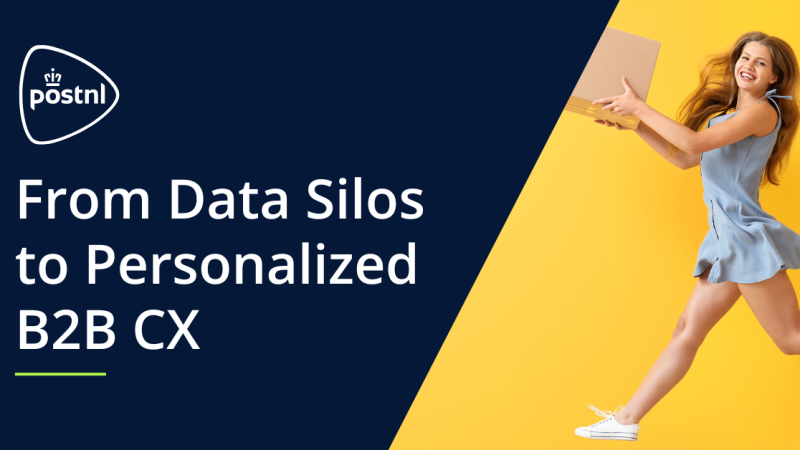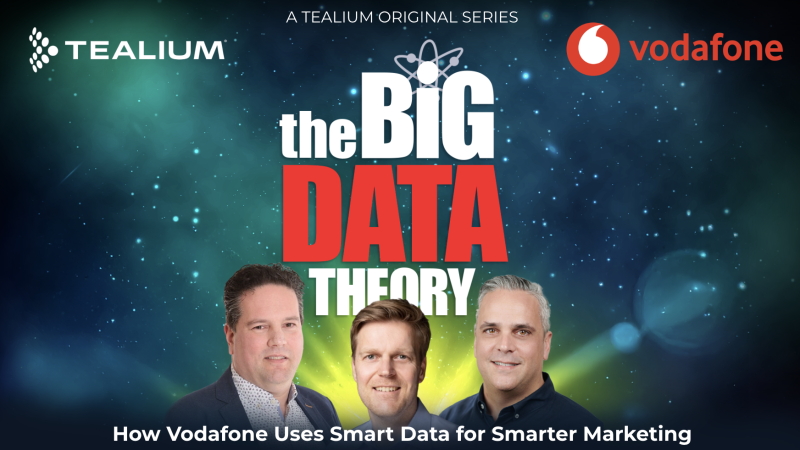The beauty of Tealium is its flexibility. You talk to 10 Tealium customers, and 10 of them will tell you Tealium is amazing for its flexibility. As Brian P. puts it on the Tealium AudienceStream G2 review profile, “Overall, AudienceStream unlocks a robust and flexible environment to fine-tune the user journey to be specific to each user’s journey and known properties. Pretty damn close to the mythical personalization at scale.”
You simply hit fewer dead ends generating value with data when you’re using Tealium.
The same can be said for the concept of a composable architecture for your tech stack. Gartner defines composable as follows: “Composable business means creating an organization made from interchangeable building blocks.” And further adds, “Composable business is a natural acceleration of the digital business that you live every day. It allows us to deliver the resilience and agility that these interesting times demand,” said Daryl Plummer, Distinguished VP Analyst.
Recently the buzzword, “composable CDP”, has emerged as a promotional term for vendors offering one component of an overall CDP solution. The use of this term can be confusing and implies that packaged CDPs do not enable a composable architecture. This enables these vendors to compete in a hot market with a solution that delivers incomplete value, but comes with the promise of maximum flexibility. While some packaged CDPs may lack the flexibility to enable a composable approach, that is not the case for Tealium. And ultimately, having access to modular capabilities from one vendor, instead of many, comes with some serious benefits.
With any Composable architectural strategy, it’s important to understand the scope; how far should the modularity and interchangeability go? If Compute workloads run more efficiently on other platforms, then certainly a multi-vendor “Composable CDP” may benefit through the Profiling and Audience Building capabilities being a component of an external system, such as an enterprise data warehouse (EDW) or Lake. The same can be said for Storage; if Storage volume is available on external platforms, doesn’t it make sense to store the CDP data on those platforms instead of paying for additional Storage through a CDP?
Tealium’s Position on Composable Architectures for Customer Data Management is that the Component Modules Should Include:
- Data Collection: Technology that automates and governs data collection should be independent of the CDP. Tealium fulfills this composable aspect in that its Event Data Framework (Tealium iQ Tag Management + EventStream API Hub) is indeed interchangeable. Tealium clients may choose any Tag Management, File Management, API Streaming solution that they like, including the capabilities that Tealium offers OOTB in the Customer Data Hub (CDH).
- Profile/Audience Management and Activation: Some Composable CDPs advocate the CDP Compute to reside outside the CDP itself; in other words, the SQL querying that takes place to calculate profile changes and Audience criteria fulfillment happen on external systems. While this may make sense economically, it draws into question as to how real-time identity resolution on the Devices/Source would take place (an EDW will not be able to connect to a device in real time). It also draws into question what the Composable CDPs role actually is, if it’s not Profiling or managing Audiences. This should be verified, because many proponents of a Composable CDP do not consider the real-time use cases as being mandatory, they view it more as a separate Identity Resolution process that can simply resolve outside of the EDW and update it later.
With respect to Activation, a case can be made that the no-code API Activation system benefits from being a modular piece to the puzzle. This would only be true if the modular choice for no-code APIs were less expensive and had more functionality. Neither one of these items resonates with respect to Tealium; in Tealium’s case, the no-code API is offered at no cost to our clients, and Tealium’s management of those APIs is fulfilled by an enterprise-class set of personnel organizations in Business Development, Engineering, Technical Education and Support. This makes the notion of composing an external vendor for Activation moot for many, if not most, enterprise clients. - Storage: The Composable CDP premise to have Storage managed by an external vendor is appropriate. Tealium does allow other platforms to store the data that is first collected, then continually collected and enriched over time. Tealium offers this composable technique at no cost; the routing of both the Event Data and Audience Data can be directed to any EDW, Data Lake, or Lakehouse. Tealium will retain a copy of the most current Profile state and Audience state in its CDP database to ensure real-time capability, but this is not to be confused with the cost of the larger storage needs.
Tealium will offer a licenseable solution for the necessary “CDP Data Retention” in a separate pricing model than its “Historical Data Storage”. The Historical Data Storage can indeed be licensed from Tealium (this solution is called DataAccess and provides storage in S3 and Redshift, plus additional features such as Data Insights for analysis and reporting and Integrated Audience Building at no extra costs), or any of our clients can choose their own storage endpoint.
How does the Tealium Customer Data Hub compare to a “composable CDP”?
Tealium’s modularity is composable in nature. The capabilities in Tealium are modular, interchangeable, cloud-based, and increasingly accessible via API. This enables us to construct solutions that make sense for our customers’ unique data landscapes and internal skillsets, thereby ensuring both maximal utilization of the owned components of Tealium, but also maximal utilization of the systems integrated with Tealium. While Tealium’s solutions are, of course, designed to work best in concert, the goal is value. The modularity of Tealium enables our customers to take a composable approach to construct their tech stack in a way that makes sense in the context of their own diverse data ecosystems.
Let’s compare a “composable CDP” (as defined by vendors using this term) to a composable approach powered by Tealium.
The schematic below explains how the Packaged CDP solution by Tealium compares to the functionality from 6 different vendors comprising a “composable CDP”:
What a composable CDP vendor would show you (click to zoom in):
 A breakdown:
A breakdown:
VENDOR 1
Vendor 1 is the Compute and Storage functionality of the Customer Data itself, and for all intents and purposes represents what people think of when they think of a CDP. It is important to note that the Compute and Storage of Customer Data is not the same thing as the Compute and Storage of the historical datasets (see Vendor 5). Tealium’s fit as a Packaged CDP most closely aligns with the fact that Customer Data Storage and Compute is a real-time capability, and that real-time capability is “composed” as separate from Tealium’s historical data processing and storage technique. Tealium is a single CDP technology platform that manages only the most recent datasets that apply to the profile and Audiences for efficiency, in concert with the historical data from the data warehouse.
As a supporting anecdote: Most CDP vendors do not isolate the Compute and Real Time Storage of the CDP itself, because the value for doing so is negligible (i.e. the cost savings do not make sense in most cases).
VENDOR 2 and 3
Vendor 2 and 3 are completely modular within Tealium just like in a “composable CDP” scenario; for example, Tealium works with clients who choose alternate Tag Management, File Ingestion, and Streaming data collection technologies. However, there are significant advantages (ever heard of garbage in, garbage out?) to have collection natively integrated with activation….or in other words, always having “connect” with your “collect”.
VENDOR 4
In a composable solution, this is generally very technical tools only accessible to technical resources. However, business users have a stake in identity resolution and customer modeling, and silo’ing this away can ultimately lead to poor experiences and inefficient operations.
VENDOR 5
This is the historical data storage of the CDP system and with Tealium, this is composable. Tealium offers DataAccess as a means to perform BI use cases upon a Warehouse or Lake (S3 and Redshift are the platforms used with Tealium); alternatively, clients may choose any Warehouse/Lake/Lakehouse for this purpose and Tealium provides built in integrations for Data Sync and Webhook templates at no cost.
VENDOR 6
This is the data activation component of the CDP. Tealium offers its own set of Data Activation APIs, no-code interfaces, and direct Event and Audience integrations out of the box at no cost, which should alleviate the perceived need to compose this piece. Tealium is a leader in Activations, and the Reverse ETL approach is a technique that can be used if desired, in addition to using Tealium’s Activation marketplaces. In many cases, Tealium’s integrations will be found to be superior to outsourced ones due to the fact that this is a discipline within Tealium managed by a dedicated group of engineers, Business Development, and Education personnel that independent vendors have great difficulty in matching output with.
Although the Tealium Connector marketplace isn’t considered Composable because it can’t be used outside of Tealium’s platform, Tealium clients are free to use any integrations from any platform they want. Data from Tealium’s CDP can be routed to any platform in real time for this purpose, or alternatively, the client may choose to have its chosen integrations platform simply source the data from the Warehouse that Tealium has designated as Storage. Either choice comes at no cost, making the choice of using Tealium’s built in integrations a more compelling one due to the ease of use, and the downside of unnecessarily complicating a business application of this nature.
What does a composable approach with Tealium look like?
Hopefully it’s clear from the above that the answer really is, ‘it depends.’ Tealium’s modular, componentized architecture means that there are a variety of configurations based on the unique ecosystem where we are adding value. For the sake of simplicity, let’s look at 2 scenarios. One where we are only leveraging Tealium’s real-time event data infrastructure and one where the full suite of Tealium’s Customer Data Hub are included.
First, in an architecture where Tealium’s Event Data Framework is being leveraged for real-time data collection and distribution:
 Tealium can function directly as a no-copy event data pipeline to unify event data collection and management
Tealium can function directly as a no-copy event data pipeline to unify event data collection and management
In an architecture leveraging the full Tealium Customer Data Hub for customer data management, we would advise taking an approach like the diagram below that ultimately provides the similar capabilities to the “composable CDP” above, but without sacrificing real-time data and a trusted partner to work with that can become a support nightmare:
 Additionally, Tealium has the inherent flexibility to also perform customer profiling and experience orchestration with or without leveraging Tealium’s infrastructure products.
Additionally, Tealium has the inherent flexibility to also perform customer profiling and experience orchestration with or without leveraging Tealium’s infrastructure products.
Ultimately, we believe the composable approach that Tealium enables offers a number of benefits over the “composable CDP” constructed of 5-6 or more vendors. These include:
- Full Pipeline Accessible to Business Teams – The component systems of a composable CDP are technical and complex, creating new silos.
- Power Real-time Use Cases – A composable CDP system cannot deliver true real-time use cases, thereby decreasing flexibility to accommodate customer expectations.
- Faster Time-to-Value – Instead of cobbling together 5 or 6 systems, work with a single vendor that can deliver end-to-end value.
- Increased Operational Efficiency – Governance across systems should not be under-estimated.
- Flexibility to Optimize, Grow Value – A “composable CDP” approach means swapping in and out new systems versus growing maturity over time in a single ecosystem.
- Less Risk for Consent, Identity, etc – It’s not worth it to take risks in a world of increasing regulatory requirements and high expectations for privacy. Tealium comes with purpose-built consent management capabilities.
- Trusted Partner for Strategy and Support – Setting a solid strategic course and troubleshooting issues across 5 or 6 vendors can be complicated and downright impossible at times.
Just like it’s always been in the diverse and fast-changing CDP landscape, picking the right vendor can be harder than it would seem. Make sure you consider the skillsets on your team and the use cases you ultimately hope to empower (not only now, but in the future) in the selection process.
Related Reading: How To Leverage Your Cloud Data Warehouse with A Real-Time CDP







